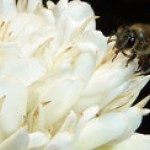caffeine
Mitochondria produce more than just ATP
Anatomy of a mitochondrion from Wikimedia Commons
Pinchas Cohen from the University of California - Davis presented data showing that mitochondria produce more than just ATP. They also make several peptides that can each affect our physiology. Some help cells respond to insulin better, some help with weight, some regulate cell metabolism. What is even more impressive is that some of these peptides have been shown to slow down the development of atherosclerosis or Alzheimer's, and some even help prevent side effects from chemotherapy in animals. Maybe…
Photo by: Leif Richardson, Dartmouth College
I came across this neat press release from the University of Massachusetts:
AMHERST, Mass. – Researchers studying the interaction between plants, pollinators and parasites report that in recent experiments, bees infected with a common intestinal parasite had reduced parasite levels in their guts after seven days if the bees also consumed natural toxins present in plant nectar.
In this early and most comprehensive study of its kind, researchers at the University of Massachusetts Amherst and Dartmouth College studied hundreds of eastern bumblebees…
On Pharyngula, PZ Myers criticizes the stubborn obfuscations of Michael Behe, who refuses to yield his illogical calculations. Behe says (rightly) that a certain mutation necessary for drug resistance in the malaria parasite has about a 1 in 1020 chance of occurring. But the mutation is also detected in 96% of malaria patients who respond well to the drug; it proliferated widely because, by itself, it had no impact on the parasite's fitness. The parasite needed another mutation, occurring at a later date, to develop resistance to the drug. Behe rests his case for divine intervention on the…
Image from The Telegraph (www.telegraph.co.uk Photo credit: Alamy)
Granted this is not comparative physiology, I thought this study was really interesting.
Research has shown that exposure of developing embryos to caffeine in utero can alter the expression of genes in the heart leading to changes in how the heart develops and functions in adult animals. New research from the University of Florida published in the American Journal of Physiology - Regulatory, Integrative and Comparative Physiology has examined changes in specific genes they believe are altered by physiologically-…
Guest Blog by Diane Bock
The Age of Enlightenment is associated with intellectual exchange, reason and sharing of the new ideas. We think of names like Isaac newton, Thomas Jefferson and John Locke. Could this new way of thinking also be connected with coffee?
During this period the coffee house emerged as a social center. People from all walks of life mixed and mingled and pollinated each others' ideas. They also started consuming buckets of coffee while moving away from swilling beer morning, noon and night. Prior to that, beer was the safest beverage…
Honeybee visiting a coffee flower, photo from Geraldine Wright
Apparently humans and honeybees share something in common when it comes to caffeine. Dr. Geraldine Wright (Newcastle University, England) discovered that bees are more likely to return to flowers that produce nectar containing caffeine. Their data suggest caffeine improves memory in bees. Caffeine is present in higher concentrations in the leaves and other tissues of the plant where it provides the added benefit of warding off predators.
According to a quote from The New York Times by Dr. Robert a Raguso at…
The grocery store magazine covers all say that home made gifts are big this year. So I thought, some of you might like to channel your inner Martha Stewart and make gifts with a science theme.
I'm here to help to you make a merry mug with one of our favorite molecules. Yep, we're talking caffeine.
1. First, we'll go to PubChem at the NCBI. It's not an exclusive (or even last) resort but there are lots of fancy molecules hanging around, just waiting to be discovered and put onto drinking containers.
2. Now, we'll look for a molecule. I'm going to use caffeine for this example since I…


